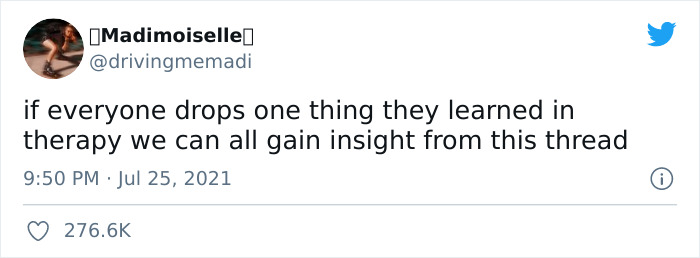
People Are Sharing The Best Things They Learned In Therapy So That Everyone Can Learn Them For Free (30 Tweets)
Our mental health is paramount. However, this message can get lost in the storm of noise that surrounds our daily routines. Before we know it, we’ve put the things that should matter to us most on the backburner and we might feel like we’re overwhelmed by work, school, life. Everything.
Even though we’re living in 2021, there’s still a certain stigma surrounding going to see a therapist. Oh, don’t get me wrong, it’s far smaller than it was decades ago (and a lot depends on where you live and the cultural context), but there are still far too many people who think that seeing a psychotherapist is something ‘shameful’ or amounts to ‘giving up.’
Fortunately, the friendly folks over on Twitter are here to help. Twitter user Drivingmemadi, aka Madimoiselle, created a viral thread, asking everyone to share at least one thing that they learned in therapy. Her mission—to help everyone get a little bit more insight into mental health, relationships, and the reasons why we do what we do. The bit about perfectionism and insecurity being linked was particularly enlightening for me.
Have a read through the therapy tips below, let us know which ones you found the most helpful, and if you’ve got any of your own to share, you’ll find the comment section particularly welcoming, dear Pandas.
Psychotherapist Silva Neves was kind enough to go into detail with Bored Panda about the stigma of seeking professional help. "I think it is getting better and there is less stigma seeing a therapist now. It depends on your location though, there are still some parts of the world where therapy is still a taboo. Some people think that seeing a therapist means that you're 'crazy,' but this is not actually what therapy is about," he said. You'll find the full interview below, dear Readers.

This post may include affiliate links.
I always say "Someone else's broken arm doesn't make my finger less broken"
My counselor tells me that a lot. Its incredibly frustrating when I can often literally wake up in the morning feeling anger (I have a bipolar disorder.) Hard to pinpoint what has made me angry overnight 🤔
"Therapy is a confidential and private space where you can get help from a professional with anything that bothers you, from your work problems, relationship issues, or other psychological problems such as post-trauma stress, depression, and anxiety," therapist Silva outlined to Bored Panda what the essence of therapy is.
"Those things are actually very common and many people struggle with these things, it doesn't mean they're crazy. Seeing a therapist when you have emotional struggles should be as normal as seeing your doctor when you have a physical problem. But at the moment, our society hasn't normalized therapy yet. It is changing with famous people talking about the benefits of therapy such as Lady Gaga and Prince Harry."
Too true. My first husband was physically abusive. Took me years to figure out why I choose him -- he was what felt normal. Hearing about the physical abuse my father witnessed; his grandmother hitting his mother, which was considered normal helped me understand why he did the same. I decided the buck stopped here. I would not raise a child in that environment. We never called him stupid or saw him as failure, instead we showed him what he did right and discussed what to do better next time. No shame or guilt. He decided what to focus on, we were advisors. He was able to share his victories and problems. As an adult he would face the same type of challenges, do we teach him how to face these difficulties or drown in them? Malicious behavior had consequences. He drew on the kitchen floor with a permanent marker, he was in preschool and knew better. Calmly without judgement or anger, he was given a toothbrush and mild cleanser. Someone had to clean it up. He gave us an evil smile, then got to work. We actively choose not to act in anger. Not to punish mistakes, only intentional acts he knew were wrong. Live was easier for all of us.
It's true. My therapist told me "You're extremely depressed", which took me by surprise because I didn't *think* I was sad. Instead, I just felt angry all the time. Which I now know was a defence mechanism.
My therapist found it very telling that I was afraid to spend time with myself - even when alone, I always made sure I had some sort of distraction because otherwise I would start to think about things I was trying to avoid thinking about. Ugly, miserable things.
Psychotherapist Silva, from the UK, told me earlier all about the insecurities we face and how they can make some people behave in wildly different ways, some of which are harmful to others. In an earlier interview, he said that self-compassion can help someone who is insecure and who has an ‘I’m not enough’ mentality become someone who’s secure and knows in their heart: ‘I’m enough.’
How insecurity manifests itself depends on the person in question. Two insecure people can behave and express this lack of confidence in themselves very differently.
This is a major theme in BoJack Horseman. In fact in one episode BoJack apologises to a guy he once screwed over, and is completely taken aback when the guy says "Okay, but I don't forgive you. You have to live with the shitty thing you did, and you need to know that it's never EVER going to be okay. Now get the f**k out of my house." And indeed they never do reconcile, because some things just aren't forgivable even if you do apologise.
OMG--so true. We're not children anymore. We did what we had to as children to survive. We don't have to repeat the same stories and behaviours.
“Insecurity can manifest either by making themselves invisible (If I'm not seen, nobody will notice my flaws), or the opposite, by what we call 'bragging': shouting at everybody about how wonderful they are. This is usually to try to persuade to themselves that they are good enough,” therapist Silva explained to Bored Panda earlier.
Unfortunately, some people choose to express their insecurity by putting others down to make themselves appear better.
"Another way to counter the 'I'm not enough' is by pushing others down, sabotaging other people's success, or attacking people as a way to feel powerful so that they can control their inner pain of 'I'm not enough'. All of these strategies don't work because what they do is either internalizing or externalizing the belief 'I'm not enough' rather than changing it," the expert told Bored Panda that we must change this behavior instead of finding ways to cope that can lead to some lashing out at the people around us.
I always say this to people. There are no bad decisions, just different risks and consequences. You took a decision based on what was less risky considering that current situation you were at. However, sometimes some risks and consequences are totally impossible to foresee.
I have to say, not all parents tried their best. At least not at parenting. My mother tried her best to make us seem like a happy, functional family from the outside but didn't do much to make it that way on the inside.
But what if you believe your first thought, wouldn't the second thought be a lie.
"The key to becoming more secure is to change the underlying belief 'I'm not enough' to 'I'm enough,'" he said that self-compassion is the way to do this.
"Perhaps parents didn't praise children enough, or they paid more attention to the mistakes rather than the successes. As an adult now, people can give themselves a hug once in a while and tell themselves, gently: 'you're doing good,' 'well done,' 'congratulations.' Eventually, the brain will listen and slowly change the message 'I'm not enough' to 'I'm enough,'" the expert said.
Coming out of a clinical depression I found it very helpful to strive every day to deliberately find one beautiful thing in my everyday environment. A flower, a building, a cloud, someone's clothes, anything. And after a while it became habit. And life got brighter because of that habit. Probably seems facetious, but it really helped me.
"Rather than shouting your praise at other people, it is about speaking to yourself in a loving way. When people are genuinely aware of their successes, they can become genuinely more confident without the need to impose their power onto others."
Relentlessly dwelling on the bad is not good for you. Give yourself a break.
Luckily I twigged onto that a long time ago! My SO reminds me greatly of my mother, easily the kindest and most supportive person in my entire life. Except my SO's even kinder and more supportive!
You're only carrying it because they ladled it onto your shoulders, due to their being too chickenshit to own it themselves.
My father told me what you think becomes what you say when you are old. He sees me as he how he did when I was a teenager. And reminds me of this often. Understanding helps, increasing the distance between us is better. How do I make sure I won't be a mean old lady..
When I get these thoughts. I acknowledge them being horrible. They are a great indicator if I need to either sleep or have a snack.
This. We tend to focus on the things we "fail" at, and ignore the successes. We beat ourselves up over the kitchen being a mess and not having the strenght to deal with it and ignore the things we DID manage to do. We look at that blanket we knitted that look like s**t/ job interview we crashed and burned/ the new recipe we tried out that turned out bad and we feel like a failure, instead of looking at it as learning. We should in general have the same attitude as when we are gaming. If you die/fail in-game you learn from in and try again. It is all practice. Keep knitting and your blankets will turn out better and better.
This is huge. Everyone needs to lose the notion that the people around them can read their mind.
My wife and I went through counseling to decide whether or mot to have kids. The therapist had me do the same list of pros & cons. The pro side was much longer. So after 25 years of parenting I now realize it is no how many things are on the pro or con side, it is the weight of each thing that matters. With parenting, the list of good things was large in number, but my experience was that the few cons took up much more time and energy to deal with. One hour of joy costs many hours or work, worry, frustration, responsibility, and expense.
Wow, I need this change of language. I can see though that it will be hard to change such an automatic reaction as I'm sorry to thank you!
Forgive? If it makes you feel better, sure, it good to work on that. Forget? No. Always learn the lesson from your experience and adjust your actions/expectations accordingly.
This has gotten me fired from many jobs in the past (NO, I will NOT be on call 24/7 for my minimum-wage job), but I don't regret it. It's been sounding like the tide is turning on this matter, and I hope for the sake of future workers that it keeps going!
I find this is unrealistic for a lot of people who have emotional issues that are due to being chemically imbalanced. There is no way to force happiness into a life. To do so or to hold oneself accountable because they have no been able to achieve this is unrealistic. Too many people experience overwhelmingly daily issues which a Hallmark moment won’t transcend
For me, it's when I notice my shoulders are sore, because I've had them up by my ears for hours. Maybe days.
Won't always help. You'll try to prove your theory, instead of trying to disprove it
Toxic positivity at its best, for both mental and physical health issues. I have a number of medical issues that are currently incurable. They can't be fixed. I may not see a cure in my lifetime. Believing that these things could be cured would engender false hope and crushing disappointment. It's healthier to admit that it can't be fixed, therefore it has to be medically treated...and accepted as reality.
The todolist works well for me, but it needs some rules: that's not necessarily a "todotoday list"; split things in smaller things (each chore instead of "chores"); write every little thing you do that is hard for you (if "get out of bed" is a thing, write it. if "shower" is a thing, write it) even after you have done it. You can even write the dates and what you did this day. Even if it's few, that's still an achievement, and you can focus on what you did instead of what you didn't, and you can be proud. The only thing you did is wake up? Be proud, it's something. Some days you did nothing? So what? Look at all the things you already did lately!
After a family crisis, a therapist once told me "cut corners where you can. Now is the time to use paper plates. Order take out if you need" etc. essentially saying to alleviate unnecessary stress. When s**t sucks, even the prospect of feeding yourself and your family and loading the dishwasher is stress-inducing.
I agree that you have to be brave, but it sure didn't make me love myself.
My father thinks he is an expert on marriage because he was married four times.
If you expect one relationship to meet all your needs, you're gonna have a bad time.
Because they wrongly believe that putting others down will raise their own self-esteem, and that's not how it works.
Some of these I really needed to hear. I get dumped on all the time. I usually have to say to others, please be mindful, **** rolls down hill and I am at the bottom. I am a target for someone else’s loose arrows (my adult son, and the situation is complicated for our relationship).
I've been in therapy since I was 4 and I'm 50 now. The best advice I EVER received was (in regards to my narcissistic alcoholic mother, who did not raise me), "you can't change her, only how you react to her." I will never forget that.
Some of these I really needed to hear. I get dumped on all the time. I usually have to say to others, please be mindful, **** rolls down hill and I am at the bottom. I am a target for someone else’s loose arrows (my adult son, and the situation is complicated for our relationship).
I've been in therapy since I was 4 and I'm 50 now. The best advice I EVER received was (in regards to my narcissistic alcoholic mother, who did not raise me), "you can't change her, only how you react to her." I will never forget that.

 Dark Mode
Dark Mode 

 No fees, cancel anytime
No fees, cancel anytime 




































































































































































